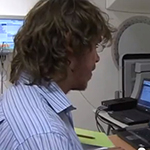The work carried out in Coventry within the MAESTRO European project on Methods and Advanced Equipment for Simulation and Treatment in Radiation Oncology (MAESTRO) has demonstrated that it is possible to reduce the amount of radiation dose delivered to healthy tissues during radiotherapy treatment by compensating for organ motion using a standard treatment couch.
The Coventry team led by Dr Haas coordinator of the Medical Technology group within CTAC (The Control Theory Applications Centre) has been working in close collaboration with the staff at the Radiotherapy Physics Department within the University Hospital in Coventry for more than 15 years.
In the last 5 years the Coventry team has been working on improving the accuracy of current closed loop control of radiotherapy treatment machines as well as developing algorithms to model and predict organ motion in the thorax and the pelvis.
The work involves many branches of engineering and computing including the image processing for the localisation of the cancerous tissue and tracking of surrogate motion, signal processing for the analysis and modelling of organ motion, artificial intelligence for the prediction of the evolution of the organ motion, systems engineering for the modelling of the medical robots used and last but not least control engineering to improve the performance of the medical equipment and robots.




Comments are disabled